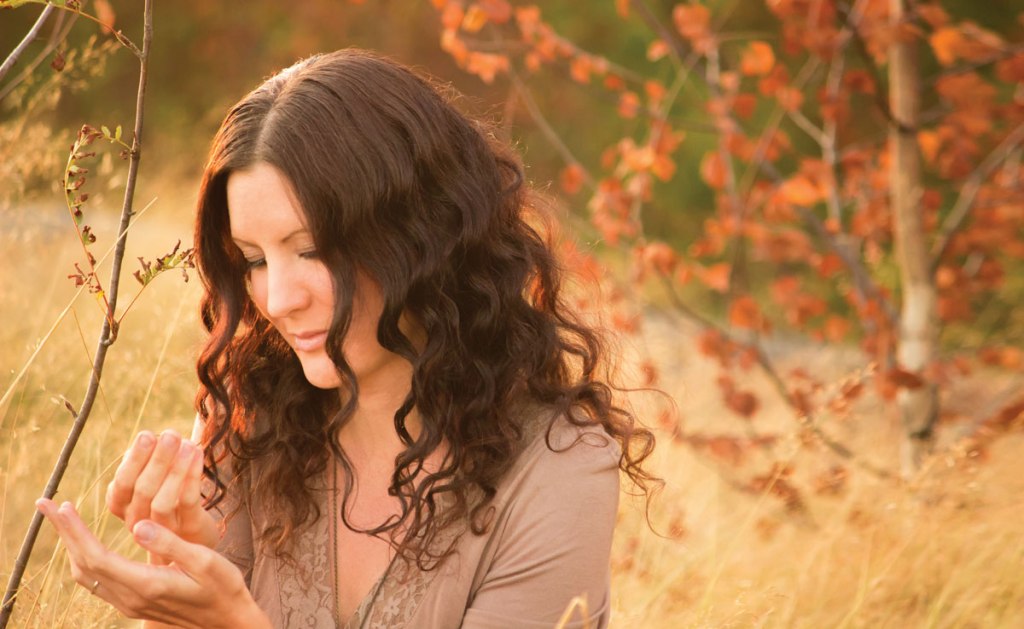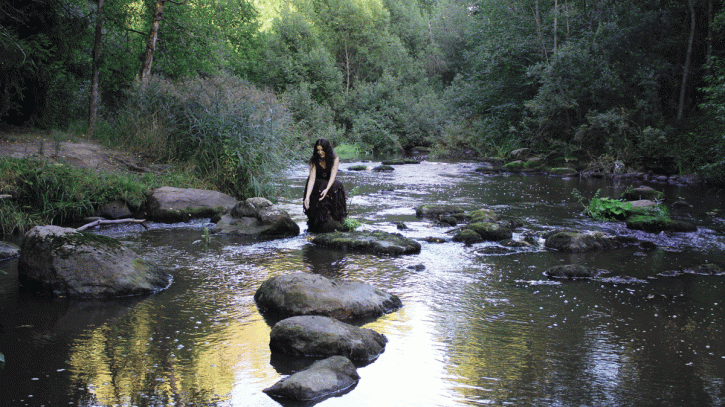A popular Finnish singer stays true to herself, and reaps unexpected rewards along the way.
WRITER J.H. WHITE, MAGNIFISSANCE
PHOTOGRAPHER JARKKO KOKKONEN
With the winter behind us and the summer ahead, days are longer, brighter, and life brims with vigor. It reminds me of one of the happiest and most touching songs I’ve ever heard — Steps of Summer by Finnish artist Anna Kokkonen.
By dreaming, a little step will lead you to your dream,
Under the sun the butterflies spread their wings together and ascend…
The irony, and profundity, is that Kokkonen wrote the song in the dead of winter, which in Finland means 20 hours of nighttime. But the darkness the singer was experiencing wasn’t simply the season.
“I had a bad experience with a record label that wanted to change me, wanted to make me more commercial,” she says. “I didn’t find it very nice what kind of photos [they wanted] to take, so it was uncomfortable, not so pure.”
To an artist, a record label promising you a future — but only if you pretend to be someone else — is heartbreaking.
“I took it quite hard because I had just started my own music, so there was a test, ‘Can you really make it?’” she says.
Kokkonen turned to her art to transcend her grief.
“I wanted to comfort myself by making a very happy song,” she says. “It’s nice that you can really cure your sadness by making a very lively song. Music is a remedy — maybe people also feel that.”
She decided to produce Steps of Summer on her own. It became her first number one hit on Radio Finland.
“The first time I heard this song [on the radio], it was summer,” she says. “That was a good lesson afterwards — when I really was freed to do what I think is correct, then things started to work out.”
While Kokkonen had a strong intuitive sense, building up the courage to trust herself and follow her own path as an artist took some time, unhappiness, and magic.

Born to sing
Kokkonen suggests her artistic path must have been preordained.
“My parents told me that even before I was able to speak, I was singing, making my own sound and melodies,” she says. “It’s been my whole life.”
Her first formal musical training, though, was violin in grade school.
“I think that classical violin has actually been very significant in my music nowadays, because [it helps with] the sense of harmony and polyphony,” she says.
As a teenager, Kokkonen traded in her violin for an electric guitar, which then inspired her to start singing and writing lyrics. Though rock was a popular genre then, and she joined some rock bands, she longed to do folk music.
“At that time, I wanted to do music, but I was ready to compromise,” she says. “I never had the courage to ask other people, ‘Would you like to play this kind of music with me?’”
Her bravery would come later, after a chance encounter with a “fairy from heaven,” she says with a laugh.
Being true to herself
In 2006, Kokkonen was busy at home writing heavy metal songs, and asked her boyfriend — who’s now her husband — to leave so she could focus. He went for a walk in the woods and discovered a woman doing “very beautiful exercises,” Kokkonen recalls. “He is quite a curious person, so he stayed there and waited until this lady had finished.”
The woman told him she was practicing Falun Dafa, an ancient Chinese mind-body meditation practice. The boyfriend returned home and told Kokkonen about the practice.
“Hey, that’s something I want to practice,” Kokkonen recalls her reaction. “I didn’t know anything about it, but this came from my mouth.” Kokkonen smiles, still surprised how drawn she was to Falun Dafa from that very first moment.
“The mystery lady, we have never met again,” Kokkonen says. “This brings more magic to this story, because we don’t know who she was.”
From that day on, Kokkonen started practicing Falun Dafa. Though the practice brought some miraculous benefits, it wasn’t always easy.
“I think [my struggles early on] have a lot to do with my artistic, emotional mind. It was very hard for me to read anything,” she says, referring to her study of Zhuan Falun, Falun Dafa’s main text. But she persevered, reading the teaching’s touching wisdom every day.
“I cried so much,” she says, recalling how she was moved by a spiritual connection she’d never experienced before.
Kokkonen had a history of panic attacks, which had grown so strong she needed to take medication.
“After starting the practice, I didn’t need to think about that anymore,” says Kokkonen, who hasn’t had a panic attack since. “You have some kind of security inside — you don’t get so lost in your mind.”
As Kokkonen continued to practice, her mind became more tranquil. Her musical inclinations changed in tandem with her inner growth.
“I’ve always had this little seed inside me about what is good, what is beautiful,” she says. “But I have never had the courage to believe in that little seed, and never really trusted that little voice inside me.”
Kokkonen felt like singing rock was too harsh for her voice, so she started taking a classical voice course.
“I wanted to change my voice in a more beautiful way,” she says. “It was a good base to really start learning to use your voice in the correct way, in a healthy manner.”
The teacher spoke about how you form the voice and use the body to support it.
“That kind of essence of voice became positive,” says Kokkonen. “You feel much better when you make music that feels beautiful — it makes you feel good and your body feel good.”
Five years after learning Falun Dafa, Kokkonen decided it was time to take a big leap of faith in her musical career.

Music her way
“When I started to practice [Falun Dafa], I became very brave,” Kokkonen says. “I wanted to follow what I feel is good music. I really had the courage to do things exactly as I want.”
Kokkonen says that when she sits down to write music, she’s not thinking of writing a hit, she just stays in tune with herself and her own barometer for what sounds good.
“It’s like going to another world,” she says. “In that world, there is no radio. There is no fame. There is just this moment. The music is connecting yourself to something bigger.”
In 2011, once Kokkonen started writing her own music, musicians came out of nowhere telling her they enjoyed her sound and wanted to play with her.
“I was so amazed what happened,” she says with a laugh. “Where did all these people come from?”
Kokkonen gives her musicians much credit, as they help her shape a sound that isn’t typical of Finnish folk music. She likes a “big sound,” almost orchestral in nature, with a hint of pop. The traditional instrumentation enhances her rich, heart-centred melodies, harmonized with lighter high notes.
Kokkonen loves strings like cello and violin, which her sister plays in the band. Kokkonen’s favourite, though, is the harp.
“I’m sure this instrument is directly from heaven,” she says. “It is so beautiful, so beautiful. It makes you stop to listen when you hear it.”
After practicing together with her new band members for a couple of years, Kokkonen was ready to make her maiden album. Not wanting a record label to try to change her, she took the next big step — and risk — on her own, producing the album with her own money.
Grace
After she produced it, she sent the album to record labels to help market it. To her surprise, she found a Finnish record label that not only got her radio play but also paid her back all the production costs. Plus, it funded two more albums.
“Whenever I made music without thinking much, then miracles have happened when I haven’t pursued anything,” says Kokkonen. “For example, making the first album with my own money, I was just thinking, ‘Okay, I will spend this money.’ Then all of a sudden, I get the money back.”
Without a desire for fame or money, blessings continued to come to Kokkonen. Her songs began to play on the radio in Finland, including two that became the most-played songs of the week on Radio Finland.
Brother was her first song to get radio play — back in 2014 — and it still gets airtime today. It’s a beautiful song with many orchestral layers and harmonies floating together; it’s moving, full of heart and kindness.
Like the healing melodies of Kokkonen’s music, the stories and themes are often about helping others and seeking truth. In this song, a sister tries to find her lost brother — a universal poem of life.
“It’s about how people who get separated from others, and in their minds, nobody is helping,” she says. “Then they are all by themselves and might do something that’s not good. It’s a worry for these kinds of people, who should be helped.”
One of her greatest musical accomplishments to date is a song that shares a similar compassion.
The golden wings touch the land,
We weave candle wicks together;
Tonight the dawn will rise,
The trail of tears will disappear.
“It’s called the Golden Land — it has a double meaning,” she says. “When I think about China, I think about the traditional culture, what kind of treasures there are in China, even though the situation in China became so troubled after the communist regime.”
Kokkonen explains the communist regime’s efforts to destroy traditional Chinese culture and values, such as the brutal era of the Cultural Revolution. After attacking cultural leaders in the ’60s and suppressing democracy activists in the ’80s, the regime then launched a horrific persecution against Falun Dafa in 1999. Kokkonen hopes to raise awareness of this persecution, which is still going on almost 20 years later.
“In the darkness, people one by one, they light up a candle,” she says, explaining the song’s lyrics. “So in the end, when many, many people have their candles, then the whole land is shining in a golden light. When one person awakens and understands the truth, it is like lighting up a candle in his or her hands.”
With Kokkonen’s authenticity, it’s no surprise that her music carries the same beauty as her intentions, brightening us with the harmony in her heart.
Photos by Jarkko Kokkonen; Janica Lönn
Source: https://magnifissance.com/selfcare/spirit-and-mind/anna-kokkonen/
Editor’s Note: Dear readers, do you know that Falun Dafa, originally from China, is currently practiced by people in over 100 countries? But in China, since Jul. 20, 1999, Falun Gong is defamed, slandered and persecuted due to the Chinese Communist Party’s fear of Falun Gong’s rapidly growing popularity. Jiang Zemin, former head of the Chinese Communist Party (CCP), perceived the spiritual discipline’s growing popularity as a threat to the CCP’s atheistic ideology.
To learn more about the persecution Falun Gong practitioners are subjected to in China, visit http://faluninfo.net/.
For more information about the practice or to download Zhuan Falun, visit: www.falundafa.org. All books, exercise music, resources, and instructions are available completely free of charge.


